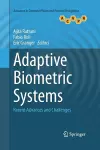
Adaptive Biometric Systems
3 contributors - Paperback
£61.99
Ajita Rattani is an Assistant Professor in the Department of Electrical Engineering and Computer Science at Wichita State University since 2019. Prior to this, she was an Adjunct Graduate Faculty at University of Missouri- Kansas City. She did her Post-doctoral and PhD. studies from Michigan State University and University of Cagliari, Italy, respectively. Her field of research is Biometrics, Machine Learning, Deep Learning, Image Processing and Computer Vision. She is the co-editor of the Springer book titled “Adaptive Biometric Systems: Recent Advances and Challenges”. She has received number of best paper awards at IEEE international conferences and is an editorial board member of IEEE Biometrics Council.
Reza Derakhshani is an Associate Professor of Computer Science and Electrical Engineering at University of Missouri, Kansas City. He is also the Chief Scientist and technology inventor at EyeVerify (now ZOLOZ), a Kansas City biometric startup that was acquired by Alibaba’s Ant Financial in 2016. He earned his Ph.D. and Master’s degrees in Computer and Electrical Engineering from West Virginia University. Dr. Derakhshani's research interests are in biometrics, computational imaging, and biomedical signal and image processing using computational intelligence paradigms. His work has been sponsored by private industry and various state and federal agencies, and has resulted in many publications and issued U.S. and international patents.
Arun Ross is a Professor in the Department of Computer Science and Engineering at Michigan State University. Prior to joining MSU, he was a faculty member at West Virginia University. He is the coauthor of the books “Introduction to Biometrics” and “Handbook of Multibiometrics”. He is a recipient of the JK Aggarwal Prize and the Young Biometrics Investigator Award from the International Association of Pattern Recognition for his contributions to the field of Pattern Recognition and Biometrics. He was designated a Kavli Fellow by the US National Academy of Sciences by virtue of his presentation of the 2006 Kavli Frontiers of Sciences Symposium.